#cultural critique
Text
wow almost seems like this whole romanticization of "girlhood" thing kind of revolves entirely around consumerisim. "little treats". 10 step skincare regimens. "girl math" as an excuse to be financially illiterate. be a good girl, don't think, just spend inordinate amts of money to conform to the latest tiktok microtrend bc that's all it means to be a girl <3
#cultural critique#cultural criticism#romanticization#girlblogging#gaslight gatekeep girlboss#girl math#little treat#tiktok trend#feminism#anti beauty industry#anti beauty culture
2K notes
·
View notes
Photo
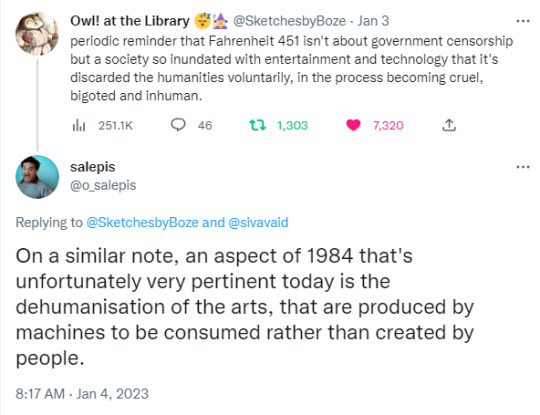
#tweet#tweets#twitter#books and literature#books and writing#books and libraries#books and authors#books and reading#1984#nineteen eighty four#fahrenheit 451#dystopian#Dystopia#AI art#AI#Society and Culture#pop culture#cultural critique#cultural criticism#technology#Entertainment#movies#film#TV#art#the arts#novel writing machine#george orwell#orwellian#orwell
944 notes
·
View notes
Text
“frankenstein,” a poem about women’s suffering
normalized in medicine, glorified in pornography, justified in religion. since we birth people, does this mean we birthed the society that causes and trivializes our agony?

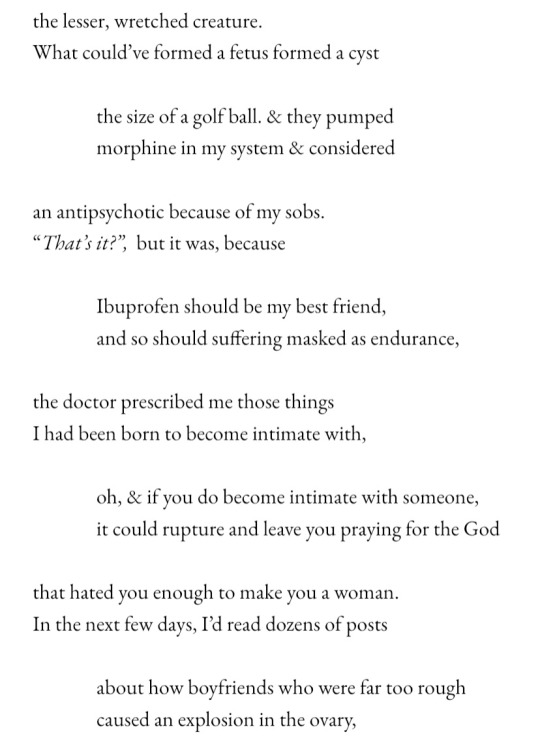



#poems and poetry#short poem#poems on tumblr#feminist poem#feminist poetry#prose#poem#feminism#writing#quotes#womanhood#struggles of womanhood#girlhood#religious themes#cultural critique#ovarian cyst
171 notes
·
View notes
Text
“Buy less. Choose well.”
-Vivienne Westwood
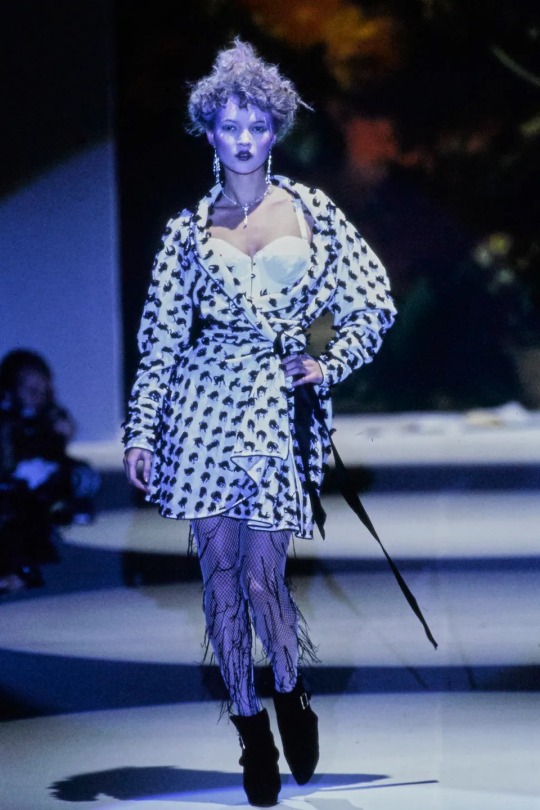

Vivienne Westwood Fall 1995 Ready-to-Wear Look 35 Modelled by Kate Moss
We are living through a global collapse as our oceans are killed by plastic, and our land melted by global warming. The big companies that run our world have decided that money is more important than the planet we all live on, and the fashion industry is not innocent. 10% of the worlds carbon emissions are from the fashion industry alone. Just last year, 235million items of clothing were sent to landfills. In this culture of fast fashion, and micro trends, clothing has become one of the biggest pollutants.
Fashion has always been a major part of society, going as far back to the old ages where it was a sign of social status, to today where it is our main form of self expression. Yet this has been exploited. The pay for labour to make clothing is decreasing, the quality of the clothing is decreasing, and yet the cost is still increasing. Even cheap companies such as Shein are racking in an impressive profit just down to their abysmal production costs. The fashion cycle goes faster, churning out new designs and trends (often stolen from independent designers) so fast that within a month they are old. Even if you aren’t one to be bothered by wearing out of style clothing, don’t worry because the clothes will be unwearably damaged in no time.
Ethical and quality clothing may be more expensive, but in the long run it will cost just the same as the countless cheap versions that have to be bought. Second hand shops, reselling and repurposing, are all great alternatives for shopping ethically. Even sewing, or knitting new clothes will make such a difference. It may be harder to follow all these rapid trends, but by buying less and better quality clothing you will be able to achieve a stable wardrobe that doesn’t need replaced monthly.
#fashion#feminism#feminist#runway#radical feminism#couture#fashion design#fashion designer#fashion runway#fast fashion#shein#shein clothes#kate moss#vivienne westwood#vw#artwork#art#opinion#cultural critique#art critique#sustainable#sustainability#self sustaining#ethical fashion#ethical considerations#ethical lifestyle#pollution#global warming
75 notes
·
View notes
Text
Waiting for purity culture to reach the point where two people or characters are sharing the same surname and the purists freak out about it being incest except even after learning it’s from a marriage they’ll insist becoming part of the same family is always inherently incestuous
20 notes
·
View notes
Text
Villains aren’t the only ones who can be sexy. Give me a tired noir detective with a loosened tie, rolled-up sleeves of his shirt and empty coffee mugs on his desk; detective who sacrificed everything chasing a criminal when everyone else gave up. Give me a good guy who thinks he needs to be a monster to catch a monster, but doesn’t want to, so he still does things by the book, because he still believes that the good is going to win in the end no matter what. Give me dark circles under his eyes, a stubble on his cheeks after not shaving for a week, cigarette butts in his ashtray and burning the midnight oil, looking at the pictures of atrocities. Give me that and I’m instantly horny
69 notes
·
View notes
Text
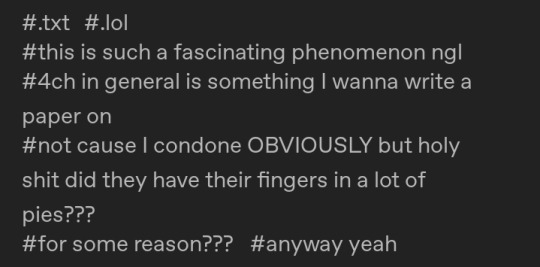
the phenomenon of an individual needing to "condone" or "condemn" everything really interests me when hits a critical point like this. maybe it results from a misunderstanding of what 4chan was/is. as if you can condemn 4chan as a homogenous culture and not at least as heterogeneous as tumblr is.
there are fascists, terfs, and libertarians who are here or were popular on here who participate in a lot of the same linguistic and cultural rituals as the progressive part of the site. some of these individuals even being critical in its cultural development. does it make any sense to "condemn" Tumblr as an entity because of this?
like obviously we can point to 4chan as the root of a lot of misogynistic and racist subcultures that now permeate the American and European Right. but then like. the origins of SCP, creepypasta, the growth of furry culture, the inception of the MLP fandom (as filled with paranoid homophobia as it was, which is obviously hilarious in retrospect), and even the standard formats for how shitpost punchlines are delivered all come from there.
they don't have their fingers in so many pies "for some reason???" it's because 4chan was a diverse and complex culture group that defined the early internet.
the continued treatment of it as "fringe" or "a place that's so scawy to visit :(", i think, creates a sense that whatever cultural products we decided to keep from 4chan were deviations from rather than products of its culture.
there are obviously a lot of problems with this. one being that it creates a lack of critical evaluation of 4chan's cultural exports (not that i'm rushing to categorize them as morally good or bad, just that it's important to consider).
another being a lack of perspective on why and how marginalized groups tended to thrive within the space in spite of its hostility towards.. everything (a kind of countercultural edgy nihilism which was not *inherently* reactionary, but definitely a response to 2001-2008 American and European neoliberal positivism).
anyways. you spend two seconds on a board that's not /pol/ and you quickly find an overarching paranoia around "redditors" who invaded after 2016 when r/The_Donald was shut down. there's a marked difference in the website's culture post-Trump, when the fascists on /pol/ (who i don't think you could call a majority) forged an alliance with Trump-aligned redditors.
pretty much any "oldfag" on the website is extremely resentful of this change. you could not take pity on them in a "where did you think such edgy nihilism would lead?" sense, but it also makes it quite clear that the website's earlier dissonance between anti-social behaviors and pro-social politics was not an accident. and while i would not want to adopt early 4chan's philosophy full sale, i do think there are things to learn from it.
whatever. post over. kisses, mwah, xoxo. 💋💋💋
14 notes
·
View notes
Text
youtube
disney's "adorkable" problem 🤪| ModernGurlz
A good look at the current trend of Disney heroines.
29 notes
·
View notes
Text
Hey bb... wanna see some hot action?
Search Google for “Midnight Climax”
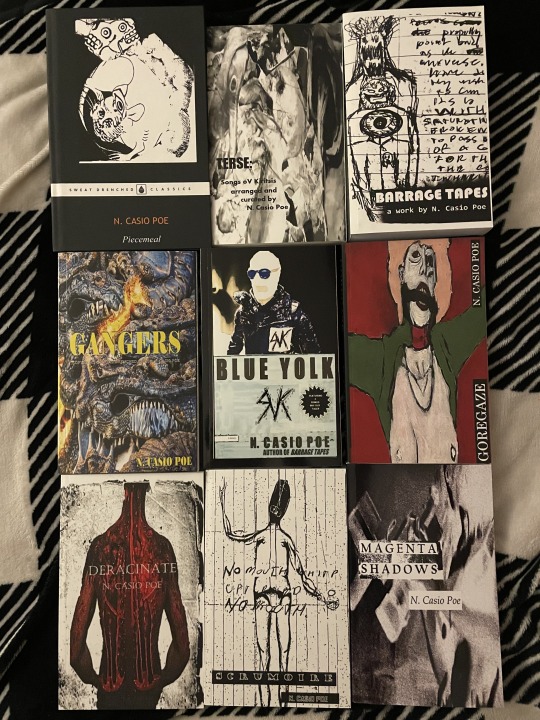
have a piece titled |}|_€^|< ^^[=@+ in Kenji Siratori’s HYPER-ANNOTATION #001
and a piece titled "Synodic Ganglia" in this one, also from Kenji Siratori.
read I ONLY WANTED TO MAKE YOU NERVOUS at Coprolaliac Press
supplied video / voice for this short film by Zak Ferguson
available NOW from SWEAT DRENCHED PRESS.
A****n link
FREE EXCERPTS
meanwhile:
CRINGE MYTHOS TONE REELS
and the piece FLOATING STAIN appears in issue 0 of AGON Journal, available for FREE in PDF form.
you’ll see i’m listed as part of the “Male Choir” (N. Casio Poe).
i’m the one that does the big “yeaaaaaaaagh” part.
other music i’ve done (just vocals/lyrics)
here
here too
LIVING ROOM - Corrugated Asshole - got some vocals on this one.
close as you’ll get to a “biography” of my time in music, which i guess is over, but who knows.
same podcast as above, except we all being chucklefucks about trash horror
MUBI page
Goodreads profile
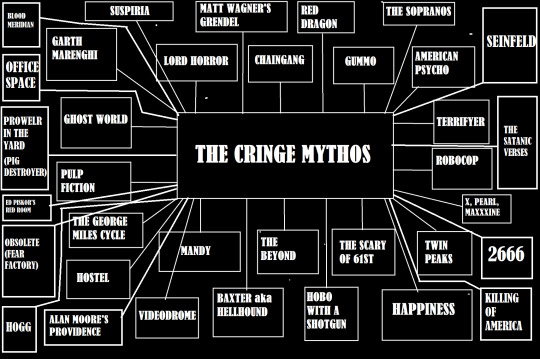
#transgressive literature#lost media#extreme horror#mutants#cultural critique#underground#apocalypse#long island#cult cinema#deathmatches#outlaw comics#surrealist writing#cutups
31 notes
·
View notes
Note
How do you feel about the desensitization social media has about tragedy and how this affects our brains? I’ve studied media and communication and I’m super passionate about this topic.
The other day I was scrolling on Youtube shorts, and I saw a girl post a video about the air quality in new york due to the wildfires in Canada. The video was satire/comedy and she sped her video up while prancing around lip singing to yellow by coldplay or something. (Side note: why do people even find these sped up videos funny? They’re annoying)
I’m just wondering if you have an opinion on how desensitized people have become. Like at first glance I was like Oh that’s a bit funny! And then I caught myself and was like hang on this really happened as is currently affecting others… that’s horrible. I’ll scroll on my snapchat news and see murder case / true crime headings reading like fun little blurbs. And people do their makeup and profit off other peoples trauma for views like they’re professionals doing it and it’s so insulting. The list really goes ON.
Do you think some studies will start coming out soon about how our empathy levels are incredibly low or even developing our brains differently because of social media’s impact on empathy and being desensitized to so many things?
Sorry for the loaded question! I’m curious to see what you think.
Thank you for this question because I've been thinking about it for like, three days straight. At first I was inclined to be like, "well, no, I think the internet is fine and our worries about empathy are just a moral panic that we see with every new technology that's developed." And then I was inclined to be like, "people have definitely become less empathetic lately, and the internet is probably a big part of that." But I think the reality is that the internet is kind of neutral. More than anything, the internet is a tool that acts to magnify and intensify the way people already are. Some people use the internet to become more aware of other people and understand their unique situations; other people use it to be trolls.
The first thing I want to talk about here is the idea that people used to be more empathetic in the past. I just don't know if that's actually true. Blood sports- games in which people are violent towards one another on purpose as a form of entertainment- have existed for most of human history. Gladiator combat in Ancient Rome is a relatively popular example of this, and often ended in the death of a gladiator. Boxing is a sport that has historically been popular and continues to be popular to this day, despite the fact that it's just two people violently attacking one another. Lynchings used to be public spectacles, where the attendants often treated these as festive events, with food, family photos, and souvenirs. I don't know that I believe we were really more empathetic in the past at all. I think we've actually really improved on the "you can't torture, maim, or kill other people or animals for entertainment" front, especially since those types of things are generally banned from social media.
And like I was saying before, I do genuinely think that the internet can foster greater understanding and empathy towards marginalized groups. I know the struggles of all sorts of groups that I might never encounter in real life. I know how to be polite to people from a variety of different cultures that I might never experience. I've been posed with some really challenging philosophical questions through the content I've been exposed to online. I'm hearing the narratives of marginalized groups that I may have never otherwise heard, and I'm hearing it in their own words. That's incredibly valuable, and I think people who have grown up in the internet age don't fully appreciate how historically rare that actually is. Up until now, history has been written by the victors, the powerful, the oppressors. Now that narrative is democratized and widely available. That's huge in terms of its ability to build empathy and understanding if we choose to be open to it.
But, that same democratization can create problems. The first is that there's not really a distinction between in-group and out-group content anymore. It used to be that there was kind of a sense of, "well, I can say that about my own [group/family/situation] to people who understand, but you can't say that, because you're not part of it and you don't get it." People create content with their in-group in mind, but it often "breaches containment"- it's seen by people who aren't in that in-group. People who are living in New York and making jokes about the air quality situation in New York are usually making those jokes for other people in New York who are in their same situation. They're trying to lighten the mood of something scary. But the people who are seeing it aren't necessarily in New York; they're all over the world, and the context and emotional intention of that joke is kind of lost. There's an implicit assumption in these videos that you're starting from a place of understanding how horrible it is because you're living it, but that's often not true of the actual viewers. In your case, you saw a funny video and thought it was funny. If you had seen a serious video about the same situation, you probably would have been like, "oh shit, this is serious. I hope the people are okay." It's not necessarily a lack of empathy here but a lack of shared context in the way the information is being presented (or something like that?)
That brings us to problem two, which is compassion fatigue. More than ever before in history, we are constantly aware of every bad thing that has happened everywhere in the world, every single day. It used to be that you would get the newspaper and it would be focused mostly on local news, with some national headlines and a couple international headlines that were really important. The information we had about bad things that were happening were mostly things we could do something about. But now, that's not really the case, right? Today, I know that the Jenin refugee camp suffered massive damage following the Israeli army's biggest assault there in 20 years. I know the Palestinians fear that the situation will escalate. I know that Allison Mack, who ran the Nxivm cult, was released from prison after serving just two years of her sentence. I know that a suspect in a Philadelphia shooting was charged with the murder of five people, and that a Canadian man is facing terrorism charges over far-right videos, and that Japan has announced a controversial plan to release treated waste water from the Fukushima nuclear plant, and that Senegal has been facing a crisis because their President, Macky Sall, was threatening not to step down after the end of his second term, and that France is protesting police violence because a police officer shot and killed a French-Algerian teenager. And I can't do anything about any of this. I just know about it, and I have to care about it because I know about it.
And we've created this weird ecosystem online where everyone feels like they need to issue a PR type statement about whatever sociopolitical thing the internet cares about in the moment to show that they're a good person who is informed, even if they don't have a significant following and aren't impacted by the issue at hand. All of us are doing a weird kind of brand management for a brand that's just our own self, and we're managing it for the sake of our friends and family because we feel like we have to. And any time a person with a significant following does publish one of those statements, inevitably there are people badgering them about why they haven't spoken on the issue that they care about that's happening in their country. I just don't think that we as people have the emotional capacity to process that much information or care about that many things, especially when they're situations that we can't really do anything about, and especially when that situation will be replaced with something new within a few days. I think that's one of the reasons so many people feel helpless and disempowered right now. There's too much to fix but no real way for us to do it, especially in the time scale the internet provides.
So in this sense, I don't think that we're lacking empathy so much as we're required to be so empathetic that we've exhausted our capacity for it. There are more demands put upon us to be empathetic than ever before, and so we reach those moments of compassion fatigue more than ever before.
The other thing that I think is worth talking about here is the way in which the internet prioritizes extremes. The goal of algorithms is generally to get people to stay on the website longer, and the easiest way to do that is by getting them to feel a strong emotion. That's why clickbait works. It's also why the internet is invested in creating so much outrage. And the easiest way to continue getting people to feel outraged is to show them increasingly outrageous things, whether or not they're true. The internet kind of got 4chanified- like teenagers on 4chan, social media algorithms and article headline writers are trying to out-do one another by recommending or posting the most outrageous thing they can in order to capture the attention economy.
This is the part that concerns me the most with regards to the internet in general. Famously, Facebook’s negligence facilitated the genocide of Rohingya Muslims in Myanmar after its algorithms amplified hate speech and Facebook failed to remove the inflammatory posts. Outrage = views = money for Facebook = more outrage bait being pushed = in the most extreme cases, genocide. And also, outrage = views = money for Facebook = more outrage bait being pushed = Donald Trump getting elected in the US. Outrage = views = money for Facebook = more outrage bait being pushed = people believing misinformation about medicine. And I think that creates a kind of interesting dynamic when it comes to empathy. Because in some sense, these people are very empathetic- they're outraged because of their empathy. They read a (fake) story about a child being victimized by a pediophilic trans teacher (or whatever) and panic because they have empathy for the children that they believe were victims. They're anti-immigration because they have empathy for the people who (they believe are) losing their jobs to immigrants. In the case of the Rohingya genocide, the Buddhist majority in Myanmar had empathy for the individuals that they believed were victimized by the Rohingya for their religious beliefs. These people were all wrong, but they're not lacking empathy. They're making a decision that an outside group isn't worthy of empathy because they've committed such heinous crimes. And that's a tale as old as time; just ask anyone who's Jewish.
I think what we need to be worried about is the ways in which the internet, and especially social media, can platform and expedite that process on a level that hasn't really been seen before. After the 2016 election, I used to really believe that we just needed to sit down with people across the aisle and have a civil, empathetic, rational conversation about the issues. But now I think that if that was ever possible, the time for it has passed. Misinformation, disinformation, and sensationalized information have become so rampant online that there's not really any way to have those discussions anymore because there's no way to agree on what is and isn't true. And unless we change something really quickly, that problem is just going to get worse with the advent of deepfake technologies and AI bots.
I feel like I've said a lot here but I haven't really come to any conclusions... but those are some of my thoughts, at least. I guess maybe it's that humans have always kind of sucked at being empathetic to people who are part of an out-group, but now we're just doing it on a global scale and reacting to threats that are (perceived to be) larger than ever before? Maybe it's that we should focus on strengthening and bettering our local communities as much as possible, and contributing on a global scale when we can? Maybe it's that media literacy is important, and we should always interact with news articles critically, even if they seem like they're a credible source?
#InternetEmpathy#VirtualNarratives#EmpathyThroughTechnology#DigitalDemocratization#SharedContextChallenge#CompassionFatigue#InformationOverload#OnlineOutrage#AttentionEconomy#SocialMediaImpacts#media literacy#cultural criticism#cultural critique
13 notes
·
View notes
Text

Insta @Cruising_Dystopia
#internet poetry#digital art#new media art#artists on tumblr#net art#glitch aesthetic#poetry and art#dark academic aesthetic#graphic art#glitch#digital collage#computer art#social commentary#ummm#ummmm#artists of tumblr#my art#poets on tumblr#digital artist#internet aesthetic#interpret this as you will#beautiful body#cultural critique#digital artwork#image macro#macro art
2 notes
·
View notes
Text
Art in the Age of Artificial Intelligence
We are entering an era of upheaval that some are calling the fourth industrial revolution.[1] The rise of artificial intelligence, and in particular generative art, threatens to upend our social and cultural landscape, leading to a renewed conflict between mechanical technique, art, and culture. While some technologists are proclaiming the death of art,[2] a murder allegedly committed by…

View On WordPress
#AI art#Art#Art and artificial intelligence#art and culture#Byung-Chul Han#cultural critique#culture and society#is ai art real art?#Jean Baudrillard#Marshall McLuhan#Philosophy#philosophy of art#social commentary#Technology#what is ai art?
2 notes
·
View notes
Text
In this episode we explore a relatively new subgenre of science fiction called Solarpunk, which aims to imagine better, more ecologically harmonious, futures on earth. In many ways Solarpunk is a reaction to both the real-world climate crisis and to the many apocalyptic visions of collapse filling our screens. Andrew Sage from the YouTube channel Andrewism joins host Jonathan McIntosh and friend of the show Carl Williams for this conversation.
References & Links
• The Andrewism YouTube Channel
• Walkaway by Cory Doctorow
• Ecotopia by Ernest Callenbach
• Sunvault: Stories of Solarpunk and Eco-Speculation
• Fighting for the Future edited by Phoebe Wagner
• Parable of the Sower by Octavia Butler
• Princess Mononoke from Studio Ghibli
• The Ones Who Walk Away from Omelas by Ursula K. Le Guin
• Emergency Skin by N. K. Jemisin
• Monk and Robot book series by Becky Chambers
• Dear Alice from THE LINE
• Dear Alice’ Decommodified Edition by Waffle To The Left
• Our History Is the Future by Nick Estes
• 3000-Year-Old Solutions to Modern Problems by Lyla June
• Capitalist Realism by Mark Fisher
#Solarpunk and How We Escape Dystopia#pop culture detective#pop culture#solarpunk#solar punk#podcast#podcasts#cultural criticism#cultural critique#movies#film#tv#books#literature#corporate media#climate crisis#environmental activism#activism#collective action#water protectors#land back
205 notes
·
View notes
Text
Aspects of the Philosophy of Postmodernism
Postmodernism is a philosophical and cultural movement that emerged in the mid-20th century, characterized by skepticism towards grand narratives, a rejection of absolute truths, and an emphasis on the subjective nature of reality. It challenges traditional notions of truth, reason, and authority, advocating for diversity, inclusivity, and the recognition of multiple perspectives. Postmodernism has had a significant influence on various fields, including literature, art, architecture, sociology, and philosophy, shaping debates on identity, power, and representation.
Some theories in the philosophy of postmodernism include:
Deconstruction: Developed by Jacques Derrida, deconstruction seeks to uncover the inherent contradictions and binary oppositions within texts and discourses, challenging the notion of stable meanings and revealing the fluidity of language.
Cultural Critique: Postmodernism often involves a critical examination of dominant cultural norms and practices, questioning established hierarchies, power structures, and modes of representation.
Relativism: Postmodernism often embraces relativistic perspectives, asserting that truth and meaning are not fixed but are instead contingent upon cultural, historical, and individual contexts.
Social Constructivism: Postmodernism emphasizes the role of social constructs in shaping our understanding of reality, arguing that knowledge and truth are socially constructed rather than objectively given.
Pluralism: Postmodernism advocates for the recognition and celebration of diversity, encouraging openness to multiple perspectives, identities, and experiences.
Skepticism: Postmodernism is characterized by a skeptical attitude towards meta-narratives or grand narratives that claim to provide universal truths or explanations of history and society.
Irony and Playfulness: Postmodernism often employs irony, parody, pastiche, and other playful techniques to subvert traditional forms of representation and challenge established norms.
Hybridity and Fragmentation: Postmodernism acknowledges the fragmentation and hybridity of contemporary culture, embracing the mixing of diverse cultural influences, styles, and forms.
Interdisciplinarity: Postmodernism encourages interdisciplinary approaches to knowledge production, drawing on insights from various fields such as literature, art, philosophy, sociology, and cultural studies.
Postcolonialism: Postmodernism intersects with postcolonial theory, which examines the legacies of colonialism and imperialism, critiquing Eurocentric perspectives and advocating for decolonization and cultural diversity.
#philosophy#epistemology#knowledge#learning#chatgpt#education#sociology#society#ideology#Postmodernism#Cultural critique#Deconstruction#Relativism#Identity politics#Social constructivism#Pluralism#Skepticism#Meta-narratives#Interdisciplinarity#Irony#Hybridity#Postcolonialism
2 notes
·
View notes
Text
Every time there’s a new article about some author putting a twist on the Romance genre with an Unhappy Ending, I have the following thoughts…
I don’t know whether these individual authors are disrespecting the genre or misunderstanding it or some fluctuating ratio of the two. But ultimately it’s always an author who wants to monetize on Romance.
Romance is a massively lucrative market, and these “let’s be radical with an unhappy ending” cretins CRAVE a piece of that money pie. They’ll contort themselves every which way to say their unhappy love story is the height of romance, that having any romance is what makes a Romance.
First off, fuck you.
Secondly, there’s a BIG DIFFERENCE between Romance, the genre, and having romance within a story. A Literary novel can have a central love story, but the core of the novel is about the protagonist’s journey, with the romance arc being just a piece of a grander scheme. Similarly, Fantasy/Sci-Fi, Mystery, Thriller, etc novels can have romance arcs, but they are not Romance. Get it?
No?
Ok, you want Romance without a happy ending?
How would you feel if you picked up a hard Sci-Fi novel and the big twist at the end was it was entirely magic all along? You got really invested in a Mystery, and the final reveal is they decided to leave it as a cold case. That Thriller novel? Third act becomes quiet slice of life.
Does that make you want to keysmash genre definitions at me?
A happy ending is what DEFINES the Romance genre. Go write your Literary love story, but don’t call it Romance. If you take away the happy ending, you’re going to get bombed with 1 stars reviews by people you misled. People who buy Romance do not want your fucking unhappy ending
44 notes
·
View notes
Text
the biggest flaw of new star wars and the reason why the sequels (and other movies, like rogue one and solo) are so bad is that the original trilogy had a load of inspirations, from buddhist philosophy through Dune trilogy, westerns, samurai movies, to arthurian mythology, while everything that came after the original trilogy had only one inspiration - the original star wars trilogy and its other derivatives.
7 notes
·
View notes